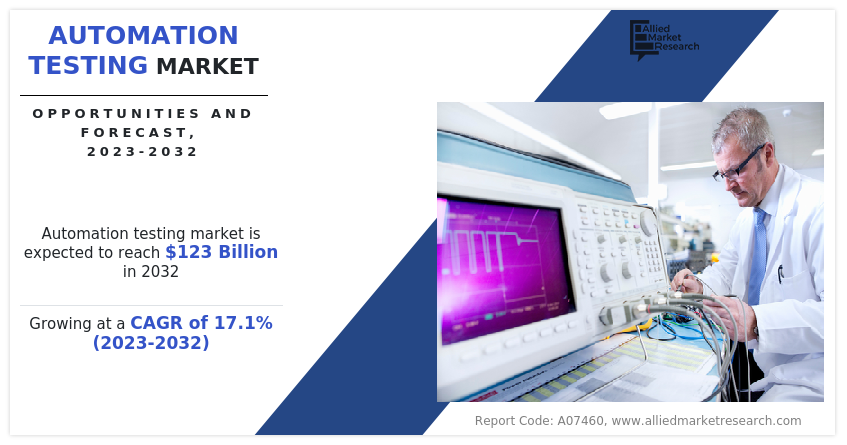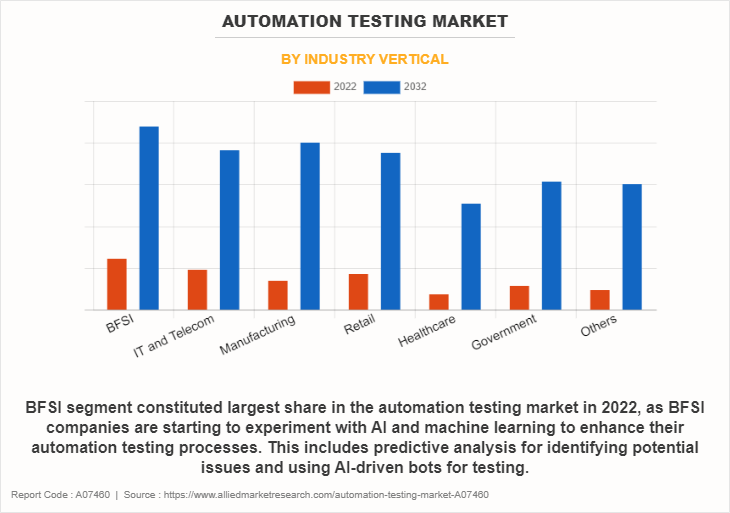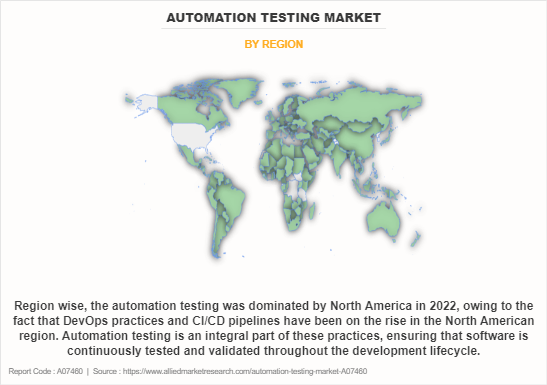Automation Testing Market Overview
The global automation testing market was valued at USD 25.7 billion in 2022, and is projected to reach USD 123 billion by 2032, growing at a CAGR of 17.1% from 2023 to 2032.
The relentless demand for faster and more efficient software development and delivery processes among organizations is fueling the growth of market. Further, the continuous evolution of technology, leading to complex applications and software systems that require rigorous testing to maintain quality and performance is boosting the demand for automation testing. Furthermore, the need for cost reduction and resource optimization is compelling businesses to automate their testing procedures, as it minimizes the dependence on manual labor and lowers the risk of human error is propelling the automation testing market growth.

However, the initial cost associated with setting up an automation framework is limiting the expansion of automation testing market. On the contrary, as businesses increasingly adopt agile and DevOps methodologies, the demand for continuous testing and rapid feedback loops is expected to grow in upcoming years. Automation testing aligns perfectly with these practices, ensuring that software development and testing processes remain in sync, accelerating time-to-market. Furthermore, the growth of IoT, AI, and machine learning technologies presents automation testing with new horizons, as these advanced technologies require comprehensive and robust testing, opening up an array of possibilities for the industry.
Introduction
Automation testing is a software testing methodology that employs automated scripts and specialized tools to execute test cases and assess the performance, functionality, and reliability of applications and systems. It streamlines the testing process by replacing manual, repetitive tasks with programmed scripts, reducing human error and increasing testing speed and efficiency. Automation testing is particularly valuable in regression testing, where it ensures that software updates do not negatively impact existing functionality. It is widely used in various industries, including software development, healthcare, finance, and manufacturing, to enhance product quality, reduce testing costs, and accelerate the release of reliable software products.
The report focuses on growth prospects, restraints, and trends of the automation testing market forecast. The study provides Porter’s five forces analysis to understand the impact of various factors such as bargaining power of suppliers, competitive intensity of competitors, threat of new entrants, threat of substitutes, and bargaining power of buyers on the market outlook.
Segment Overview
The automation testing is segmented on the component, testing type, interface, industry vertical and region. On the basis of component, it is categorized into solution and service. On the basis of testing type, it is classified into static testing and dynamic testing. By interface, the market is segmented into mobile testing, web testing, desktop testing, and software testing. Based on industry vertical, the market is divided into BFSI, IT & telecom, manufacturing, retail, healthcare, government, and others. Region wise, the market is analysed across North America, Europe, Asia-Pacific, and LAMEA.

By industry vertical, the BFSI segment acquired a major automation testing market size in 2022. The is attributed to the fact that BFSI companies are adopting sophisticated test automation frameworks and tools. These frameworks allowed for faster test case creation, maintenance, and execution, making it easier to handle complex financial software systems. Further, managing test data is a critical aspect of automation testing. Organizations are implementing solutions to create, manage, and secure test data effectively, ensuring that sensitive customer information is not compromised during testing.

By region, the North America dominated the automation testing market share in 2022. This is attributed to the fact that DevOps practices and CI/CD pipelines have been on the rise in the North American region. Automation testing is an integral part of these practices, ensuring that software is continuously tested and validated throughout the development lifecycle. Further, the adoption of cloud-based testing solutions has been increasing, providing scalability, flexibility, and cost-efficiency for testing efforts.
Key Market Players
The key players operating in the global automation testing market include IBM, Apexon, Accenture, Cigniti Technologies, Capgemini, Microsoft, Tricentis, Keysight Technologies, Sauce Labs Inc., and Parasoft. These players have adopted various strategies to increase their market penetration and strengthen their position in the automation testing industry.
Top Impacting Factors
Increasing Adoption of Cloud-based Automation Tools
The demand for agility and scalability in software development has pushed organizations to embrace cloud-based solutions. With the cloud, testing environments are provisioned and scaled on-demand, enabling faster and more efficient testing processes. Further, the rise of remote and distributed teams has made cloud-based tools an attractive choice, as they facilitate collaboration and access to testing resources from anywhere in the world. This trend was further accelerated by the global shift to remote work in response to the COVID-19 pandemic.
Furthermore, the cost-effectiveness of cloud-based solutions is a compelling factor, as they eliminate the need for extensive on-premises infrastructure and reduce maintenance expenses. In addition, cloud-based tools often offer automated updates and maintenance, freeing up testing teams to focus on their core responsibilities. As a result, cloud-based automation tools have become instrumental in enhancing the efficiency, scalability, and collaboration capabilities of modern software testing, making them an indispensable component of the automation testing market.
Rising Adoption of Agile and DevOps in Software Development
Agile and DevOps emphasize iterative development and continuous integration, which enable faster releases of software updates. Automation testing is a natural fit in this context, as it streamlines the testing process, ensuring that new code is thoroughly examined and integrated seamlessly. In addition, the increasing complexity of software applications, along with the proliferation of diverse platforms and devices, necessitates comprehensive and rapid testing, making Agile and DevOps a pragmatic approach.
Further, the demand for enhanced collaboration across development and testing teams is pushing the adoption of these methodologies. Agile and DevOps encourage closer cooperation between developers, testers, and operations teams. This collaborative environment fosters the sharing of information, early bug detection, and quick issue resolution, all of which are pivotal in automation testing. Thus, rising adoption of Agile and DevOps in software development is fueling the growth of the automation testing market.
Integration of AI and ML in Test Automation
AI and ML technologies are being harnessed to enhance the efficiency and effectiveness of test automation processes. One notable trend is the use of AI/ML algorithms for predictive analytics, allowing testing teams to identify potential issues and prioritize test cases more intelligently. This predictive capability helps in optimizing test coverage and reducing testing cycles. In addition, the development of self-healing test automation frameworks powered by AI and ML. These frameworks can autonomously identify and correct test script failures, reducing the need for manual intervention and speeding up the testing process.
Further, AI and ML are being employed for intelligent test data generation, which is particularly valuable in complex, data-driven applications. These technologies can analyze the application's behavior and generate realistic test data, ensuring comprehensive test coverage. AI-driven test case generation is another trend, where ML algorithms automatically create test cases based on historical data and application behavior, making the testing process more adaptive and comprehensive. Furthermore, the automation testing market is also witnessing the integration of AI-powered test automation tools that offer image and text recognition, natural language processing, and anomaly detection. These capabilities help in testing user interfaces, APIs, and identifying irregularities in application behavior.
Market Trends and Landscape
Increase in product launched to enhance automation testing and adoption of the advance technologies are some of the trends flourishing the automation testing market growth. For instance, in October 2023, IBM launched watsonx Code Assistant, a generative AI-powered assistant that helps enterprise developers and IT operators code more quickly and more accurately using natural language prompts. The product delivers on two specific enterprise use cases. First, IT Automation with watsonx Code Assistant for Red Hat Ansible Lightspeed, for tasks such as network configuration and code deployment. Second, mainframe application modernization with watsonx Code Assistant for Z, for translation of COBOL to Java.
Furthermore, increasing partnerships in the market by key players is expected to boost the growth of automation testing market during the forecast period. For instance, in June 2023, Leapwork, the visual, AI-powered test automation platform, entered into a partnership with Microsoft to enable customers and partners to drive innovation and achieve continuous quality across Microsoft Dynamics 365 and Microsoft Power Platform. Microsoft customers and channel partners can utilize Leapwork’s solution to manage monthly software updates seamlessly and automate business processes across any application or technology.
The automation testing market has experience a surge in growth during the pandemic owing to rising demand for digital solutions among the businesses. One notable impact was the swift transition to remote work, which led to a surge in online activities and increased reliance on digital services. This shift underscored the importance of having resilient, secure, and user-friendly applications. Automation testing became indispensable in ensuring that these applications functioned seamlessly and delivered an optimal user experience, even under increased loads.
Furthermore, the healthcare industry also witnessed a significant impact, with an urgent need for testing and validation of medical software, telehealth platforms, and diagnostic tools. Automation testing was instrumental in expediting the development and deployment of critical healthcare solutions during the pandemic. Thus, the pandemic had a positive effect on automation testing industry.
Regional Insights
The North America automation testing market is analyzed across the U.S. and Canada. DevOps practices and CI/CD pipelines have been on the rise in the North American region. Automation testing is an integral part of these practices, ensuring that software is continuously tested and validated throughout the development lifecycle. In addition, the adoption of cloud-based testing solutions has been increasing, providing scalability, flexibility, and cost-efficiency for testing efforts.
There has been a growing emphasis on shifting testing processes to earlier stages of the software development lifecycle. Automation testing is crucial in enabling this trend, allowing for early detection and resolution of issues. Further, in both the U.S. and Canada, data privacy and security regulations have become more stringent. Automation testing is used to ensure that applications comply with these regulations.
Furthermore, the growth of IoT devices has led to the need for specialized automation testing solutions to ensure the functionality and security of IoT applications and devices. Moreover, the adoption of RPA for business processes in the region has led to the need for automation testing of RPA workflows to ensure accuracy and reliability. Thus, thee are the major trends for automation testing market in North America region.
The Asia-Pacific automation testing market is analyzed across China, Japan, India, Australia, South Korea, and rest of Asia-Pacific. The Asia-Pacific region has been experiencing a rapid digital transformation, with businesses across various industries shifting online. This has led to an increased demand for automation testing to ensure the quality and reliability of digital applications.
The growth of e-commerce platforms and mobile applications in Asia-Pacific has driven the need for specialized testing solutions for web and mobile. Automation testing is crucial for ensuring a seamless user experience. Further, automation testing providers are increasingly integrating artificial intelligence (AI) and machine learning into their solutions. AI is used for test automation script generation, predictive analytics, and intelligent test case selection. Cloud-based testing solutions are gaining popularity in the region due to their scalability and flexibility.
These solutions allow companies to access testing resources on-demand, making them cost-effective and accessible. Furthermore, The Asia-Pacific region has seen the introduction of various data privacy regulations and cybersecurity standards. Automation testing is used to ensure compliance with these regulations, such as GDPR-like regulations in India and various data protection laws in the region. With a growing gaming industry in the region, there's a demand for quality assurance and automation testing for gaming applications, including mobile and console games. Thus, these are the major growth factors for automation testing in Asia-Pacific region.
Key Industry Development
Recent Partnerships in the Automation Testing Market
In October 2023, Accenture collaborated with SAP to help organizations adopt generative AI across their core business processes. Together, the companies will create AI-enabled solutions and use cases that can enhance an organization’s investment in SAP technology by improving business performance and employee productivity, accelerating time to value with SAP S/4HANA Cloud.
In August 2023, IBM expanded its collaboration with Microsoft to help joint clients accelerate the deployment of generative AI and deliver a new offering that will provide clients with the expertise and technology they need to innovate their business processes and scale generative AI effectively.
In December 2021, Accenture and UiPath , a leading enterprise automation software company, announced an expanded business partnership to help companies boost the adoption of enterprise-wide automation, accelerate technology transformation efforts and create new growth opportunities.
Recent Acquisition in the Automation Testing Market
In August 2023, IBM announced it has completed its acquisition of Apptio Inc. after receiving all required regulatory approvals. The acquisition gives clients the ability to derive additional value through the powerful combination of Apptio and IBM. Further, the combination of Apptio products and IBM's IT automation portfolio will give businesses a 360-degree technology management platform they can use to optimize and automate decisions across their IT landscapes.
In July 2021, Sauce Labs Inc. announced that it has acquired Backtrace, a provider of error monitoring solutions for software teams. Backtrace enables organizations to mitigate application risk and improve digital quality by empowering development teams to rapidly deploy code with the confidence that they can quickly identify and remediate bugs across their environments including production.
Key Benefits for Stakeholders
This report provides a quantitative analysis of the market segments, current trends, estimations, and dynamics of the automation testing market analysis from 2022 to 2032 to identify the prevailing automation testing market share.
The market research is offered along with information related to key drivers of automation testing, restraints, and opportunities.
Porter's five forces analysis highlights the potency of buyers and suppliers to enable stakeholders make profit-oriented business decisions and strengthen their supplier-buyer network.
In-depth analysis of the automation testing market size segmentation assists to determine the prevailing automation testing market opportunity.
Major countries in each region are mapped according to their revenue contribution to the global market.
Market player positioning facilitates benchmarking and provides a clear understanding of the present position of the market players.
The report includes the analysis of the regional as well as global automation testing market trends, key players, market segments, application areas, and market growth strategies.
Automation Testing Market Report Highlights
| Aspects | Details |
| Market Size By 2032 | USD 123 billion |
| Growth Rate | CAGR of 17.1% |
| Forecast period | 2022 - 2032 |
| Report Pages | 279 |
| By Component |
|
| By Testing Type |
|
| By Interface |
|
| By Industry Vertical |
|
| By Region |
|
| Key Market Players | Capgemini, Tricentis GmbH, Cigniti Technologies Ltd., Accenture, Sauce Labs Inc., Keysight Technologies, Inc., Apexon, Parasoft, IBM Corporation, Microsoft |
Analyst Review
The growing demand for faster software development and continuous integration and deployment (CI/CD) practices is fueling the adoption of automation testing to ensure quicker release cycles and improved software quality. Further, artificial intelligence (AI) and machine learning (ML) are being integrated into automation testing tools to enhance test case generation, predictive analytics, and anomaly detection, making testing more intelligent and efficient. Furthermore, there's an increasing focus on ensuring the security of applications and systems, prompting the use of automation testing for security and vulnerability assessments. Moreover, the expansion of automation testing into emerging technologies such as IoT, 5G, and cloud-native applications is opening new avenues for growth and innovation in the market.
The key market players are adopting strategies such as partnership for enhancing their services in the market and improving customer satisfaction. For instance, in June 2022, Keysight Technologies, Inc., and Sauce Labs Inc, the leading provider of continuous testing and error reporting solutions, have partnered to deliver cloud-based testing of enterprise applications on mobile devices, browsers and secure desktops. Keysight's Eggplant cloud-based test automation platform combined with the Sauce Labs real and virtual device clouds and software platform, delivers artificial intelligence (AI)-driven automated testing of applications across thousands of devices, browsers and OS combinations, providing comprehensive coverage and significantly accelerating testing while helping customers to rapidly scale.
Moreover, some of the key players profiled in the report are IBM, Apexon, Accenture, Cigniti Technologies, Capgemini, Microsoft, Tricentis, Keysight Technologies, Sauce Labs Inc., and Parasoft. These players have adopted various strategies to increase their market penetration and strengthen their position in the industry.
The global automation testing market was valued at USD 25.7 billion in 2022, and is projected to reach USD 123 billion by 2032
The automation testing market is projected to grow at a compound annual growth rate of 17.1% from 2023-2032 reach USD 123 billion by 2032
The key players profiled in the report include automation testing market analysis includes top companies operating in the market such as IBM, Apexon, Accenture, Cigniti Technologies, Capgemini, Microsoft, Tricentis, Keysight Technologies, Sauce Labs Inc., and Parasoft.
Asia-Pacific is expected to grow significantly in automation testing market during the forecast period.
Increasing adoption of cloud-based automation tools, rising adoption of Agile and DevOps in software development, and integration of AI and ML in test automation majorly contribute toward the growth of the market.
Loading Table Of Content...
Loading Research Methodology...



